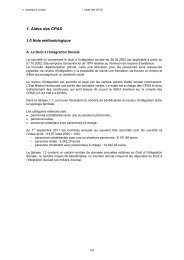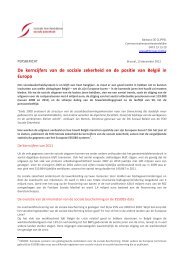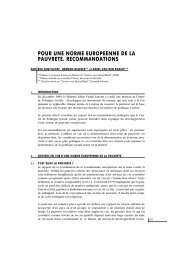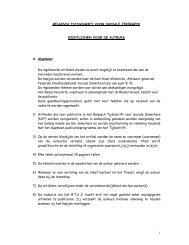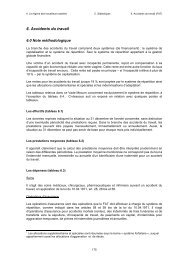IntroductionA. The importance of <strong>social</strong> <strong>security</strong>The basic concept underlying our <strong>social</strong> <strong>security</strong> system is solidarity. This solidarity operatesbetween:- the employed and the jobless;- the young and the old;- the healthy and the ill;- people with an income and people without;- families without children and those with children;- etc.This solidarity is guaranteed because:- working people have to pay <strong>social</strong> <strong>security</strong> contributions based on their salary;- the <strong>social</strong> <strong>security</strong> system is largely financed by the community, i.e. all the citizens as awhole;- the trade unions, the health insurance funds (or 'mutual insurance funds') and theemployers' organisations co-decide about various aspects of the system.Concretely, <strong>social</strong> <strong>security</strong> intervenes in three events:- in case of wage loss (unemployment, retirement, incapacity for work) you will obtain asubstitution income;- if you are to bear specific '<strong>social</strong> charges', such as raising children or sickness costs, youwill receive a supplement to your income;- if, independent of your own will, you do not have a professional income, you will receiveassistance allowances.B. A little historyThe Belgian <strong>social</strong> <strong>security</strong> system was not built in one day. Rather, it is the result of severalevolutions that have occurred during the past 150 years. Some features of the various periods ofthe past are still present in the current system.The beginning of our <strong>social</strong> <strong>security</strong> system can best be set in the period of the first industrialrevolution and the rise of capitalism. Poverty, until that period usually solved within the familyor with charities, is finally considered a problem of society. That consciousness led to thecreation of so-called 'Civil Hospices' and of 'Offices of Benevolence', the predecessors of ourcurrent public centres for <strong>social</strong> aid (OCMW - CPAS). Secondly, the industrial revolution has givenrise to specific risks, as the workers were forced to work in the mills: sickness, incapacity for work,unemployment, etc. In order to insure themselves against these new risks, the workers createdtheir own 'Societies for Mutual Assistance'. These voluntary mutual insurance funds protectedthe affiliated workers against the new <strong>social</strong> risks. They procured, for instance, benefits in caseof unemployment or incapacity for work of the breadwinner or if he became too old to continueto work, etc. Under the influence of the emerging trade unions, these local Societies for MutualAssistance were transformed into health insurance funds (ziekenfonds - mutualité). Next to the6
initiatives of the workers themselves, several christian-inspired employers created family benefitfunds, providing indemnity for workers with children. These were private initiatives; there was noquestion of government contributions yet.Due to the huge crisis which led to the national strikes of 1886 it became clear that governmentintervention was absolutely necessary. From 1891 onwards, the government starts to subsidisethe 'mutualities'. This government intervention has had positive effects, both financially andstructurally. The various local 'mutualities' were grouped, bringing about a more efficientmanagement. Belgium saw the creation of the 'national unions' that we still know today. Still, theunions remained a form of voluntary insurance and the workers had no obligation to participate.The first compulsory insurance was only created in 1903: the insurance against accidents at work.Between the two World Wars, the whole of compulsory insurances has expanded strongly. Salariedpersons were compulsorily insured for old-age and survivor's pensions, occupational diseases,family benefits and paid leave (today known as annual vacation). Self-employed persons wereonly compulsorily insured for family benefits from 1937 onwards. The '<strong>social</strong> risks' (sickness,invalidity and unemployment) remained within the subsidised private sphere of 'mutualities' andtrade unions. Another milestone between the World Wars was the first law ensuring a guaranteedincome for disabled persons.During World War Two, representatives of the workers' trade unions, the employers' organisationsand some high officials met to conclude a 'draft agreement for <strong>social</strong> solidarity'. In 1944, the threeparties involved signed the '<strong>social</strong> pact'. The <strong>social</strong> pact had two major pillars: the <strong>social</strong> peacebetween trade unions and employers' organisations and the concept of solidarity (the <strong>social</strong>insurance was to improve the living conditions of the workers). In fact, the <strong>social</strong> pact was themere technical co-ordination of what had grown in an unstructured way before. Yet, the <strong>social</strong>pact brought some important innovations:- all <strong>social</strong> insurances (including unemployment, sickness and invalidity insurance) weremade obligatory for all workers;- benefits went up;- the National Office for Social Security (RSZ - ONSS) was created as a central body tocollect the <strong>social</strong> contributions;- <strong>social</strong> <strong>security</strong> was controlled with equal representation, i.e. by both the workers andthe employers.The <strong>social</strong> pact contained no clauses about accidents at work and occupational diseases, for thesetwo risks were countered with private insurances, nor about the disability policy, which wasfinanced with tax money. Bear in mind that the <strong>social</strong> pact only applied to salaried persons andnot to self-employed persons.Already in 1937, there was an obligatory family benefit scheme for the self-employed. Otherinsurances, like those against old age and for medical care, became obligatory only much later.In 1956, the pension insurance became obligatory and eight years later, the self-employed, toowere obliged to insure themselves against the 'big risks' in medical care. Only in 1967, the '<strong>social</strong>scheme of the self-employed' was created, integrating all the existing systems. Since 1971, theself-employed are also insured for benefits in case of incapacity for work.During the period after World War Two, which was primarily characterised by economic expansion,the entire <strong>social</strong> <strong>security</strong> system grew enormously. On the one hand, <strong>social</strong> <strong>security</strong> was aimed7



